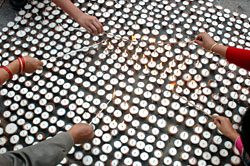|
|
The peace accord this week is the formal declaration of a cessation of armed conflict. Nepalis are rightly euphoric. A situation which seemed to get darker the longer you looked at it now seems contained, manageable.
But the road in the months ahead will not be smooth or straight. No matter how hopeful we are, there will be bargaining, waffling, and fighting out the details of a complicated process of normalisation.
In this space, we have always maintained that the Maoists need time to convince their hothead commanders about the peace process. This is called giving the Maoists the benefit of doubt. But right until the deal was signed, the comrades gave us less and less reason to trust them. Their recruiting spree to pad their cantonments and fool the UN into thinking they really have 35,000 warriors included forced enlistment of school children, hotel workers, and young villagers.
Just as there are reasons to doubt the Maoists' sincerity, it is also possible that residual royalists are still plotting a comeback.
But all sides and their leaders, no matter how far they believe they have come, can't turn this into another political wrangle for power and posts.
We cannot afford to lose sight of what is really at stake here. We need to move forward, not slide right back into the old ways of thinking, complete with selfishness, parochialism, and lack of vision. Nepalis have sacrificed and suffered far too much to settle for that.
Second chances don't come around often. We've got one now, but it's also a last chance to get this right. Outside of party agendas, what should a future Nepal look like? How can we move past Kathmandu and think for the nation as a whole? How can Nepalis move out of the shadow of fear: of guns, discrimination, hunger, and hopelessness? Some of the answers are obviously political, but others concern social justice and reaching out to the forgotten, the hungry in Karnali, dalits who barely survive on the fringes of life in Saptari.
Yes, the peace process is important, but there is nothing stopping the interim government from also moving quickly to restore this country's momentum on education, healthcare, microcredit, and investment to create jobs. That's what this has been about all along. The parties all lost sight of it once. We can't make the same mistake again.



